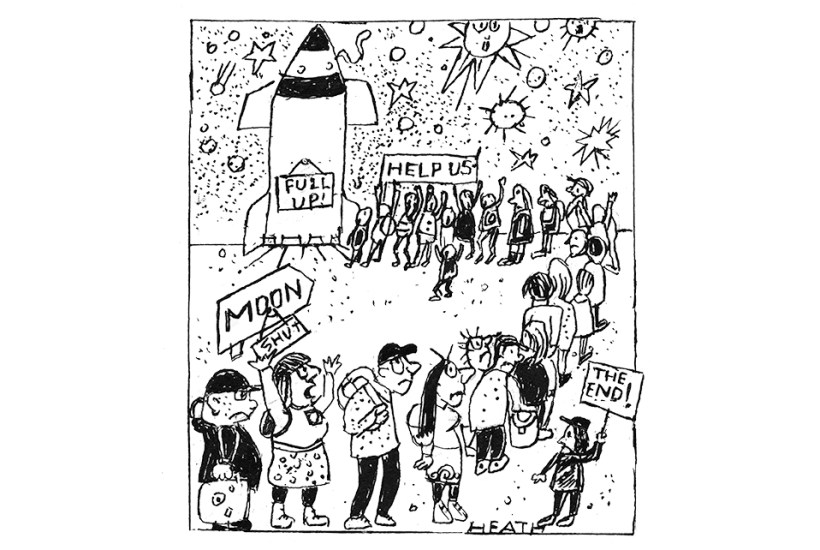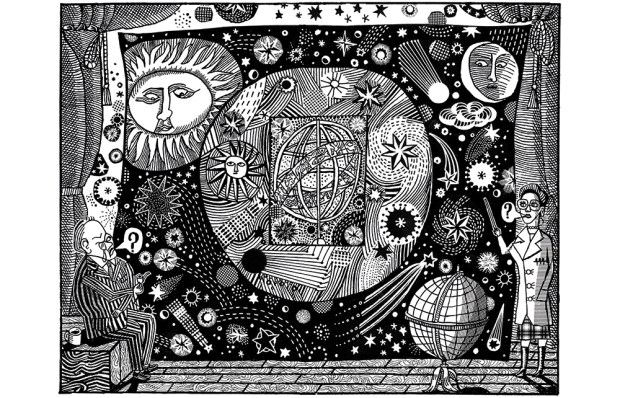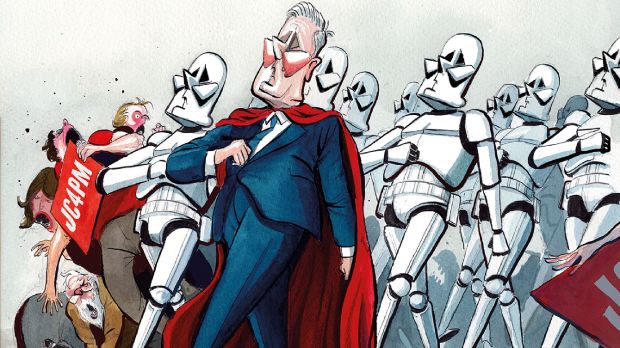Because I have the title Astronomer Royal, I’m often asked: ‘Did you do horoscopes for the Queen?’ Sadly, the answer’s ‘no’. I’m just an astronomer, not an astrologer. Scientists are poor forecasters – almost as poor as economists. But I fear I’ve become typecast as a doomster because I predict a bumpy ride through the next few decades.
We’re deep in the ‘anthropocene’. Humans are so numerous and so demanding of energy and resources that our collective footprint is changing the world’s climate, and despoiling the natural environment. Politicians like to focus on immediate threats, but they won’t prioritise measures needed to deal with long-term global issues – especially when it’s countries far away that are most threatened – unless there’s a clamour from voters. We need technical advances that enable the ‘global south’ to leapfrog directly from smoky stoves to clean energy, just as they leapfrogged to smartphones without ever having landlines.
And we face challenges from bio and cyber technologies which, despite offering huge benefits, have scary downsides. Scientific breakthroughs are viewed with ambivalence rather than enthusiasm. By the turn of the century, biology may have transformed healthcare, but genomics may have advanced enough to render ‘designer babies’ conceivable, in both senses of that word. Would we welcome that? And what about the new Altos Labs – two in California and one in Cambridge – which focus on extending our lifespan? When their billionaire founders were young, they wanted to be rich; now they’re rich they want to be young again. That’s not so easy. In any case, would we welcome such a fundamental and unnatural inequality that such technology would bring?
Some worry, though, that they will die before this research succeeds. The Alcor company in Arizona has a solution: it will store your body, it claims, until immortality is on offer and you can be resurrected or have your brain downloaded. Two Oxford academics I know have signed up for this ‘cryonics’ programme. They wear pendants round their necks which signify that if they drop dead their bodies should be seized and frozen in liquid nitrogen. Each to their own: I’d much rather end my days in an English churchyard than an American refrigerator.
A higher priority, though, should be to alleviate the still-incurable illnesses that can cloud our later years. Until that’s done, ‘assisted dying’ should be an option. But despite UK polls showing that 80 per cent support this, its legalisation remains strongly opposed in the House of Commons. Peers are more representative of public opinion on this issue; there are even archbishops on both sides. But their views will have zero effect unless the government allows time for the Commons to debate a bill.
Incidentally, it’s good news that Keir Starmer proposes to push beyond the changes in the Lords that Labour implemented 20 years ago. The case for reform is strengthened now that Boris Johnson’s controversial nominees have pushed the number up towards 850. Membership remains a privilege, but it’s no longer an honour. I hope a reformed chamber (and indeed the government) will find room for a few scientists: there’s a scientific component to more and more aspects of policy – though of course, as we learnt during the pandemic, it’s often uncertain. Odd though it may seem, some familiar issues are more baffling than phenomena far away in the cosmos. Astronomers have detected ripples in space from two black holes crashing together a billion light years away; they can describe that amazingly exotic and remote event in some detail. In contrast, experts are still befuddled about everyday things that we all care about. Take diet and childcare, for instance. When I was young, milk and eggs were good; a decade later we were warned off them because of cholesterol – but today they’re OK again.
Nasa’s huge Artemis rocket recently had its test flight – inaugurating a programme aiming to send humans to the moon – and eventually to Mars. By 2100 there might be many volunteers for space travel, some perhaps even accepting one-way tickets to Mars. But don’t expect mass emigration from Earth. It’s a dangerous delusion to think that space offers an escape from Earth’s problems. Dealing with climate change on Earth is a doddle compared to terraforming Mars.
This raises the question astronomers are often asked: do aliens exist? Or is the galaxy waiting for a diaspora of our progeny? I think we’ll get clues from next-generation telescopes. But some people claim to know the answer already – and many of them like to write me green-ink letters. I respond usually by asking: if aliens had made titanic journeys across interstellar space, would they just meet one or two well-known cranks, maybe make some corn circles, and then leave? And I urge them to write to each other, not to me.
One of my favourite aspects of teaching at Cambridge is our music, especially at this time of year. College choirs sustain this country’s choral tradition – whose inspirational excellence is highlighted by the special services held during the Christmas season. That’s something to cherish in the encircling gloom.
The post Space won’t offer an escape from Earth’s problems appeared first on The Spectator.
Got something to add? Join the discussion and comment below.
Get 10 issues for just $10
Subscribe to The Spectator Australia today for the next 10 magazine issues, plus full online access, for just $10.
You might disagree with half of it, but you’ll enjoy reading all of it. Try your first month for free, then just $2 a week for the remainder of your first year.














Comments
Don't miss out
Join the conversation with other Spectator Australia readers. Subscribe to leave a comment.
SUBSCRIBEAlready a subscriber? Log in